Hi,Steemit Uses today I want to talk about"Chinese New Year 2018 — Holiday Guide, Traditions, Activities"
Chinese New Year or 'Spring Festival' is China's most important festival and holiday. The next CNY falls on Friday, February 16th 2018, beginning a year of the Dog.
CNY is celebrated by a quarter of the world! Spring Festival is a major holiday in mainland China, Hong Kong, Macau, and Taiwan, and in many of China's neighboring countries such as Singapore and South Korea. And it's celebrated in the world's many China towns.
When It Is and Animal Signs
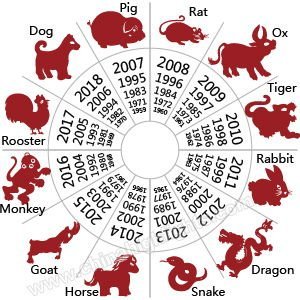
2018 is a year of the Dog.
CNY's date is decided by the Chinese lunar calendar, and it changes every year, but it's always in the period January 21 to February 20.
It's** **traditionally celebrated for 16 days, from the eve to Lantern Festival (March 2nd 2018). The coming 7-day Spring Festival public holiday will be February 15–21, 2018.
Each Chinese year is associated with an animal sign according to the Chinese zodiac. Chinese traditionally believe that years begin and end at Chinese New Year, rather than January 1. 2018 is a year of the Dog.
Traditions and Activities
In China, traditions and celebrations vary greatly across the country. In the North, Chinese dumplings are the must-eat food on Chinese New Year's Eve, but south of the Yangtze River most people eat spring rolls or sticky rice cake.
The main traditions include eating reunion dinner with family, giving red envelopes, firecrackers, new clothes, and decorations.
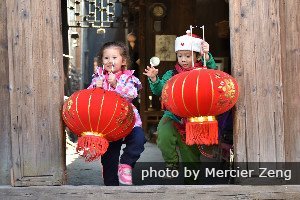
Red lanterns are hung for Chinese New Year.
Traditionally, Chinese people believe that the Kitchen Stove God is the god of the kitchen and affairs of the home. Now fewer and fewer Chinese worship the Kitchen God on lunar month 12 day 23 to pray for blessings on their home life. Chinese spring cleaning: A week before the new year begins, from the 23rd of the 12th lunar month (February 8, 2018), the tradition is Chinese people clean their houses thoroughly. The cleaning represents a wish to bid farewell to the old year, and welcome in new year good fortune.
Decorating Buildings and Streets with Lucky Red Items
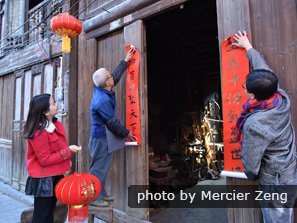
Red couplets are put up for Chinese New Year.
Every street, building, and house where Spring Festival is celebrated is decorated with red. Red is the main color for the festival, as red is believed to be an auspicious color.
Red lanterns hang in streets; red couplets are pasted on doors; banks and official buildings are decorated with red New Year pictures depicting images of prosperity.
Most public decoration is done a month before, but home decoration is traditionally done on Chinese New Year's Eve. As 2018 is a year of the Dog, decorations related to dogs will be commonly seen. There are red dog dolls for children and New Year paintings with dogs on.
Chinese New Year's Eve — Family Time
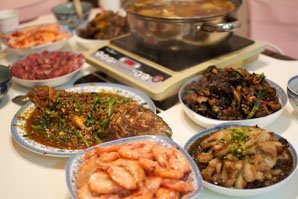
New Year dinners have many meaningful dishes.
CNY is a time for families to be together. Wherever they are, people are expected to be home to celebrate the festival with their families.
The Reunion Dinner
The New Year's Eve dinner is called 'reunion dinner', and is believed to be the most important meal of the year. Big families of several generations sit around round tables and enjoy the food and time together. Dishes with lucky meanings must be included in the dinner such as fish, dumplings, and spring rolls.
Some Chinese worship their ancestors before the reunion dinner, to show that they are putting their ancestors first.
What to Eat — Top Lucky Foods
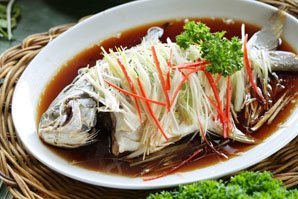
Fish is a must for the CNY reunion dinner.
Chinese people like eating, and they eat a lot during the Spring Festival.
Food for the New Year emphasizes lucky symbolic meanings such as fish, which means 'surplus'. These foods are served during the 16-day holiday season from the eve of CNY to the Lantern Festival.
Staying up for Midnight Celebrations
Like people waiting in New York Time Square to see the ball dropping, Chinese people have the custom of staying up late on our New Year's Eve to welcome our new year's arrival.
After reunion dinner, families normally sit together to watch the Spring Festival Gala, one of the most watched TV shows in China. At the same time, most people send WeChat red envelopes or short messages to acquaintances by phone.
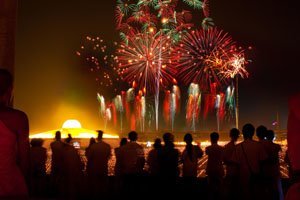
Firecrackers and Fireworks at Midnight
It has long been a Chinese tradition to set off firecrackers from the first minute of their new year. Fireworks have increasingly been added to the cacophony.
From public displays in major cities to millions of private celebrations in China's rural areas, setting off firecrackers and fireworks is an indispensable festivity. New Year Gifts and Red Envelopes
Like at Christmas in other countries, people exchange gifts during the Spring Festival. In rural areas and for older people the New Year gift giving tradition is still strong, but increasingly younger people prefer just to receive red envelopes (by hand or electronically).
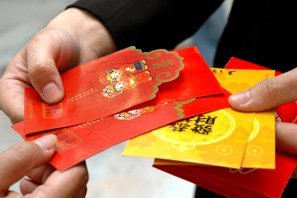
Giving red envelopes is a custom at Chinese New Year.
The most common New Year gifts are red envelopes. Red envelopes have money in, and are believed to bring good luck because they are red. They are given to children and retirees. Customarily only employers give red envelopes to working adults.
In many Chinese cities, from New Year's Day, traditional performances can be seen: dragon dances, lion dances, and imperial performances like an emperor's wedding. A great variety of traditional Chinese products are on offer, and strange Chinese snacks, rarely seen the rest of the year.
Beijing's temple fairs are the place to go for traditional activities in Beijing. They are held in parks from the first day of the lunar year to the Lantern Festival.
Chinese New Year's History and Its Evolution
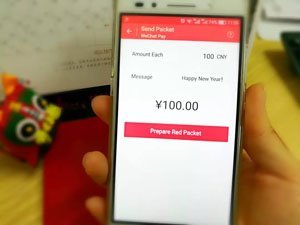
Preparing a WeChat red envelope.
The festival has a history of over 3,000 years. Celebrations on lunar New Year's Day can be dated back to the ancient worship of heaven and earth. Over the centuries new traditions were added and celebrations became more entertainment-orientated.
In 1967 food was rationed, and there was no money! Greetings were full of communist fervor. Now people eat out for Chinese New Year, send e-money, and greet with instant messages on WeChat (the most popular app in China).
Superstitions — Things You Must/Mustn't Do
Chinese people believe that the year's start affects the whole year, so Spring Festival is a season of superstitions. Chinese people have long believed that what something looks like (color, shape), and what its name sounds like, gives it auspicious or ill-fated properties.
There are lucky foods and gifts and rituals, but also many CNY Taboos
A Practical Day-by-Day Guide to Chinese New Year 2018
If you are in China during 2018's festive period, the following table will be useful to you. See when transport is most crowded, when it improves, when there are lots of fireworks, when banks and government offices are open, when shops re-open, what the local customs are, etc.
| Date | Activities | Transport | Business |
|---|---|---|---|
| February 1–14 | Millions homeward-bound, cleaning, shopping | Crazy busy | End of year company events; winding down of operations |
| February 15 (New Year's Eve) | Pasting red couplets, hanging red lanterns, the New Year reunion dinner, setting off firecrackers, giving red envelopes to kids, staying up late to watch CCTV's New Year Gala | Better, but local transport can be busy | Most shops close by the afternoon |
| February 16 (New Year's Day) | At midnight a barrage of fireworks and firecrackers like WW3, more firecrackers in the morning (before opening the door) and early evening (before dinner); giving kids red envelopes | Quiet | No bank or government office is open. Only big shopping malls are open. |
| February 17 (New Year day 2) | Visiting friends or relatives, firecrackers for greeting guests and before dinner | Quiet | Almost no bank or government office is open. Only big shopping malls are open. |
| February 18 ( New Year day 3) | Visiting friends and relatives in the city or friends and family in nearby villages | Local travel and town and village buses are busy, but travel to other cities and domestic flights are ok. | Some banks and government offices are open, but business is limited and hours are much shorter. Only some big shopping malls are open. |
| February 19–20 (month 1 days 4 and 5) | The statutory holiday period is over. Some people will keep visiting friends and relatives; some will go back to work. | Very busy | Most banks and government offices will be open, but business is limited and hours are shorter. Most shops will be open. |
| February 21 (New Year day 6) | For some it's the first day back at work. | Very busy | Some shops, companies, and offices will reopen on this day, because 6 is a lucky number in Chinese culture. |
| February 22 – March 2 (New Year days 7–15) | Return travel; Lantern Festival is on month 1 day 15 (March 2) | Crazy busy | Some businesses may choose day 8 (February 23) to reopen, as 8 is also a lucky number. The non-superstitious may reopen on day 7 (February 22). |
Travel at Chinese New Year — Top Tips from Our Experts
The festive period is one of the best times of the year to interact with Chinese people, and experience the local culture.
All enterprises and public institutions in China will take a 7-day holiday, but they will have staff on duty. In 2018, the public holiday will be February 15–21. Most large malls, tourist attractions, public transport, hotels, and restaurants will open as usual, or even stay open longer.
Author: NICHOLAS
.gif)
Hi! I am a robot. I just upvoted you! I found similar content that readers might be interested in:
https://www.chinahighlights.com/travelguide/special-report/chinese-new-year/
Downvoting a post can decrease pending rewards and make it less visible. Common reasons:
Submit